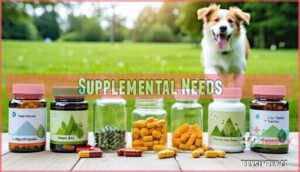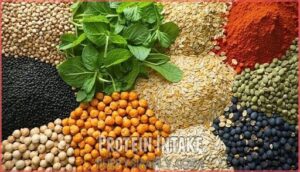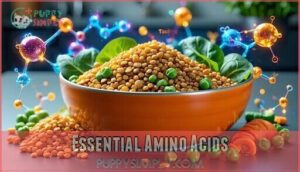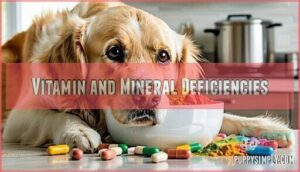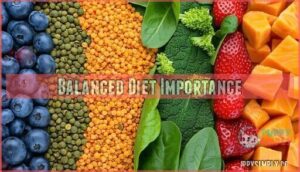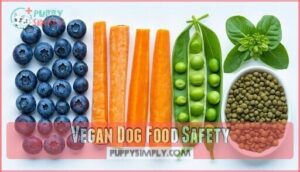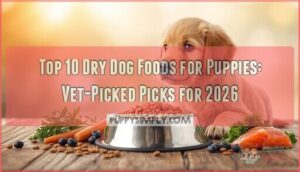This site is supported by our readers. We may earn a commission, at no cost to you, if you purchase through links.

Dogs are omnivores who can digest plant-based foods, unlike cats who require meat. However, vegan diets need careful formulation to provide essential amino acids like taurine, vitamin B12, and proper protein levels.
Commercial vegan dog foods exist, but quality varies substantially. Homemade vegan diets carry higher risks of nutritional deficiencies that can cause serious health problems.
Your vet’s guidance is vital before making this shift, as individual dogs have different nutritional needs based on age, size, and health status. Success depends entirely on proper planning and ongoing monitoring to guarantee your dog thrives.
Table Of Contents
- Key Takeaways
- Dogs Vegan Diet Basics
- Can Dogs Be Vegan
- Vegan Dog Food Options
- Nutrient Deficiencies Risks
- Balanced Diet Importance
- Vegan Diet Health Benefits
- Feeding Puppies Vegan
- Vegan Dog Food Safety
- Sustainability Considerations
- Veterinary Guidance Importance
- Frequently Asked Questions (FAQs)
- Can dogs eat a vegan diet?
- Are all dogs vegan?
- Is vegan dog food safe?
- Can dogs survive without meat?
- How do vegans feed their dogs?
- How long can a dog survive on a vegan diet?
- Can senior dogs safely transition to vegan diets?
- How do vegan diets affect dog energy levels?
- What are signs of successful vegan diet adaptation?
- Do vegan dogs need different exercise routines?
- Conclusion
Key Takeaways
- You’ll need professional veterinary guidance before switching your dog to vegan food – it’s not a DIY project that you can wing without risking serious health complications
- Commercial vegan dog foods are your safest bet since they’re formulated to meet nutritional standards, while homemade vegan diets carry significant risks of dangerous nutrient deficiencies
- Essential supplements like taurine and vitamin B12 aren’t optional – your dog must get these nutrients that are naturally found in meat through careful supplementation to avoid health problems
- Regular health monitoring is crucial throughout your dog’s vegan journey, with veterinary checkups every 3-6 months to catch any nutritional deficiencies before they become serious issues
Dogs Vegan Diet Basics
You’re probably wondering if your dog can thrive on a plant-based diet, and the answer isn’t as simple as yes or no.
Dogs are omnivores who can digest plant foods, but switching to a vegan diet requires careful planning to meet their specific nutritional needs.
Nutritional Requirements
Your dog’s nutritional requirements form the foundation of any successful vegan diet.
Dogs need 18% minimum protein from sources like legumes and yeast, balanced fat ratios including omega-3s, and careful vitamin supplementation for B12 and D.
Mineral balance requires attention to calcium and iron levels, while proper fiber intake supports digestion without hindering nutrient absorption in canine nutritional needs, ensuring a balanced diet.
Common Misconceptions
Many believe veganism unnatural for dogs, but this oversimplifies canine nutrition.
Dogs aren’t strict carnivores—they’ve evolved to process plant-based protein sources effectively.
Digestibility concerns often stem from poor formulation, not plant ingredients themselves.
While palatability issues and cost factors exist with some vegan dog food options, quality commercial vegan diet for dogs products address these challenges through careful formulation and testing, ensuring a well-planned vegan diet.
Veterinary Perspectives
Veterinary agreement on vegan dog diets remains divided, with research limitations creating ongoing debate.
Veterinarians emphasize ethical obligations while drawing from clinical experience to guide recommendations.
Their holistic approach prioritizes safety:
- Veterinary nutritionist consultation before diet changes
- Regular veterinary supervision throughout adjustment periods
- Detailed health monitoring with blood work
- Individualized veterinary advice based on each dog’s needs
Most veterinarians recommend veterinary care oversight when considering plant-based diets.
Can Dogs Be Vegan
Unlike their wolf ancestors, your dog can absolutely thrive on a carefully planned vegan dog diet. Dogs are omnivores with remarkable diet digestibility for plant-based foods, making vegan dog nutrition scientifically feasible when done right.
However, can dogs thrive vegan depends entirely on proper formulation. Your dog’s gut microbiome adapts well to plant proteins, but breed differences matter. Larger breeds may need different protein ratios than smaller ones.
Energy levels typically remain stable on quality vegan diets, though some dogs initially experience digestive adjustments. The ethical implications drive many owners toward plant-based feeding, but vegan dog health requires professional oversight.
Dogs lack certain enzymes for processing high-fiber plants, so commercial formulations work better than homemade attempts. While possible, shifting isn’t automatic. Your dog’s individual needs, age, and health status determine success.
A gradual switch with veterinary monitoring guarantees your pup gets complete nutrition without compromising their wellbeing. This approach ensures a smooth transition to a plant-based feeding regimen, which is crucial for your dog’s overall health and happiness.
Vegan Dog Food Options
When choosing vegan dog food, you’ll find established commercial brands offer scientifically formulated options that meet nutritional standards.
These options are preferable because homemade diets carry significant risks without proper expertise.
These plant-based foods require careful supplementation with essential nutrients like taurine, vitamin B12, and omega-3 fatty acids to support your dog’s health.
Commercial Brands
Several vegan dog food brands meet AAFCO standards with proper ingredient sourcing and protein content.
V-Dog offers 24% protein with taurine supplementation, while Wild Earth provides 23% protein exceeding guidelines.
Benevo holds Vegan Society accreditation for complete vegan dog food formulas.
These commercial vegan diets address palatability concerns through specialized formulations, though individual dogs may vary in acceptance.
Many owners buy vegan options for their pets.
Homemade Diets Risks
Despite best intentions, homemade vegan dog food carries serious risks of nutritional deficiencies.
Studies show 60% of recipes lack essential vitamins, while 75% skip nutritional analysis entirely.
Formulation errors create dietary imbalances leading to health consequences like heart disease from amino acid deficiency.
Considering homemade vegan dangers, pet owners should proceed cautiously.
Toxic ingredients and lack of supervision make homemade preparations particularly dangerous for your dog’s wellbeing.
Supplemental Needs
Your dog’s vegan journey needs careful supplementation to thrive.
Taurine supplementation prevents heart problems, while vitamin B12 sources combat anemia. Omega-3 fatty acids from algal oil support brain health, and L-carnitine benefits muscle function.
Mineral balance requires zinc and iron fortification since plant absorption rates lag behind. These vegan dog supplements aren’t optional—they’re essential safety nets.
Consider brands like V-Dog Kind Kibble for complete nutrition.
Nutrient Deficiencies Risks
When you’re considering a vegan diet for your dog, you’ll need to watch carefully for several critical nutrient deficiencies that can seriously impact their health.
Even well-formulated plant-based diets can fall short in providing essential proteins, amino acids, vitamins, and minerals that dogs typically get from animal sources.
Protein Intake
Your dog’s protein intake becomes the foundation for their health on a vegan diet.
Adult dogs need at least 18% crude protein on a dry matter basis.
Plant proteins from soy, peas, and lentils offer 75-90% digestibility rates.
However, protein quality matters more than quantity – combining different protein sources creates complete amino acid profiles that support muscle maintenance and overall wellbeing, which is crucial for overall wellbeing.
Essential Amino Acids
Plant-based protein sources typically contain insufficient levels of essential amino acids that your dog’s body can’t produce internally.
Without careful supplementation, these deficiencies can seriously compromise your pet’s health and development.
- Taurine Supplementation – Critical for heart health since plant proteins lack this amino acid
- Methionine Sources – Often deficient in grains and legumes, requiring synthetic additions
- Lysine Deficiency – Common in corn-based diets, affecting protein synthesis
- Plant Bioavailability – Lower absorption rates mean higher quantities needed for adequate nutrition
Vitamin and Mineral Deficiencies
Missing vitamins and minerals can create serious health problems for your vegan dog.
Taurine deficiency leads to heart issues, while inadequate B12 sources cause anemia.
Calcium balance and phosphorus levels affect bone strength, and poor iron absorption creates fatigue.
You’ll need targeted supplements to prevent these dog vitamin deficiencies and amino acid shortfalls.
Balanced Diet Importance
Creating a balanced vegan diet for your dog requires understanding that plant-based nutrition must carefully replace the complete protein profiles and essential nutrients typically found in animal products.
You’ll need to make certain adequate levels of all amino acids, vitamins, and minerals through strategic food combinations and targeted supplementation to prevent nutritional gaps that could harm your pet’s health, ensuring a diet with essential nutrients and proper amino acids.
Animal-Based Protein Role
While animal-based protein offers complete amino acid profiles and excellent protein digestibility, your dog’s body doesn’t inherently require meat sources for muscle maintenance and organ health.
Traditional proteins like chicken and beef naturally contain taurine sources and essential amino acids.
However, a well-formulated plant-based dog diet can meet these same nutritional requirements through strategic supplementation, making vegan dog food a viable alternative when properly balanced to satisfy your dog’s dietary needs.
Whole Food Sources
When building a balanced vegan dog diet, you’ll want whole foods as your foundation.
Quality plant sources provide essential nutrients naturally, though careful selection matters for proper health.
Here are key whole food categories for your plantbased dog diet:
- Legume benefits – Lentils, chickpeas, and black beans offer complete proteins and fiber
- Grain options – Brown rice, quinoa, and oats provide energy and B vitamins
- Vegetable diversity – Sweet potatoes, carrots, and leafy greens supply vitamins and minerals
- Seed advantages – Flaxseeds and chia seeds deliver healthy omega-3 fatty acids
To guarantee proper nutrition, consider veterinary nutritional guidelines.
Synthetic Supplements
Most vegan dog food requires synthetic supplements to bridge nutritional gaps that plant sources can’t fill.
You’ll find taurine, L-carnitine, and vitamin B12 additions in AAFCO-compliant formulas.
However, supplement bioavailability varies, and nutrient stability during processing affects effectiveness.
Many owners buy taurine supplements for dogs to guarantee adequate intake.
Over-supplementation risks exist, so choose reputable brands using quality synthetic sourcing for their dog dietary supplements.
Vegan Diet Health Benefits
While you might worry about your dog missing out on meat’s benefits, research shows vegan diets can actually improve some aspects of canine health when properly formulated.
Studies indicate that 38% of dogs on plant-based diets develop healthier, shinier coats, and 90% with digestive issues show better stool consistency compared to their meat-eating counterparts, which can be a significant benefit.
Reduced Allergies
Food-sensitivity battles become easier when you switch to vegan dog food.
Plant-based diets eliminate common allergens like beef, chicken, and dairy that trigger food intolerance.
Your dog’s immune response calms down, reducing allergy symptoms like itching and digestive upset.
This dietary shift supports gut microbiome balance, promoting better skin health and overall dog health benefits.
Improved Coat Condition
Several studies show that 38% of dogs on vegan diets develop healthier, shinier coats.
Plant-based nutrition can improve coat health when properly supplemented with essential fatty acids. However, you’ll need veterinary guidance to confirm your dog’s skin conditions don’t worsen from nutrient deficiencies.
Signs of improved coat health on vegan dog food:
- Coat Shine – Natural oils from omega-3 supplementation create lustrous fur
- Reduced Shedding – Better nutrition minimizes excessive hair loss around your home
- Skin Hydration – Plant-based ingredients can soothe dry, flaky skin issues
- Allergy Relief – Fewer animal proteins mean less scratching and irritation
- Omega-3 Impact – Essential fatty acids support healthy skin cell regeneration
Potential Longevity
Looking beyond the bowl, research shows promising connections between vegan diets and dog longevity.
Studies indicate vegan-fed dogs averaged 1.2 extended years compared to conventional diets. However, these health markers depend entirely on proper nutrition and veterinary oversight for quality aging.
| Diet Type | Average Lifespan | Health Outcome |
|---|---|---|
| Vegan (balanced) | 15.4 years | Reduced obesity, fewer allergies |
| Conventional | 13.1 years | Standard health markers |
| Vegan (unbalanced) | Reduced | Nutrient deficiencies |
| Raw | 14.2 years | Good health indicators |
| Homemade vegan | Variable | High deficiency risk |
The vegan lifespan advantage only appears with nutritionally complete commercial vegan dog food and consistent monitoring.
Feeding Puppies Vegan
Feeding puppies a vegan diet requires extreme caution since growing dogs have higher protein and nutrient demands than adults.
You’ll need specialized veterinary supervision to guarantee proper development, as nutritional deficiencies during puppyhood can cause permanent health problems.
Growth and Development
Puppies need double the protein and calories of adult dogs for proper Puppy Development. Growing pups require extra calcium and phosphorus for Bone Health, plus essential amino acids for Muscle Growth.
Their Energy Needs and developing Immune System demand carefully balanced vegan dog food that meets AAFCO standards.
Puppy nutrition differs substantially from adult dog dietary needs—dog nutrition research shows deficiencies can cause permanent skeletal issues.
Veterinary Guidance
Professional oversight becomes non-negotiable when feeding puppies vegan diets.
You’ll need dog nutritionist guidance for diet customization based on your puppy’s breed and growth rate.
Regular deficiency monitoring through blood work helps catch health risks early.
Your veterinarian will establish supplementation protocols and provide ongoing dog dietary consultation to guarantee proper development throughout this critical growth phase, ensuring proper development.
Vegan Dog Food Safety
When you’re choosing vegan dog food, safety starts with understanding regulatory standards and manufacturer practices.
You’ll want to look for brands that meet AAFCO nutritional standards and undergo rigorous quality testing to guarantee your dog gets complete, balanced nutrition.
Regulatory Standards
All commercial vegan dog food must meet strict AAFCO Standards and FEDIAF Guidelines before reaching store shelves.
These regulatory frameworks guarantee your dog’s nutritional needs are met through proper formulation and testing.
- AAFCO Standards require minimum nutrient levels and feeding trial data for complete dog foods
- Labeling Requirements mandate accurate ingredient lists and nutritional adequacy statements on packages
- FEDIAF Guidelines establish European standards for balanced plant-based canine nutrition
- Ingredient Approval processes verify safety and nutritional value of plant-based components
- Compliance Enforcement includes facility inspections and product testing by regulatory agencies
Quality Control Measures
Quality control measures protect your dog’s health through rigorous testing and verification processes.
Reputable manufacturers implement batch testing protocols, verify ingredient sourcing authenticity, and conduct feeding trials to validate nutritional claims.
Look for brands that provide detailed manufacturing processes information, maintain AAFCO compliance records, and guarantee label accuracy matches actual nutrient content for reliable dog food safety and ensure reliable dog food quality.
Manufacturer Reputation
Research dog food brands thoroughly before choosing commercial vegan dog food.
Check brand transparency about ingredient sourcing and ethical practices.
Review recall history and customer reviews on dog food labels.
Established manufacturers invest in dog food quality testing and nutritional research.
Dog food consumer reviews reveal real-world experiences with specific products and potential issues.
Many brands adhere to AAFCO standards for nutritional completeness and follow strict guidelines to ensure the quality of their products, which is a key factor in choosing the right vegan dog food.
Sustainability Considerations
You’re likely wondering if choosing vegan dog food helps the environment and aligns with your values.
The meat industry creates significant carbon emissions and resource consumption, making plant-based pet food an appealing option for environmentally conscious owners.
Environmental Impact
Choosing vegan dog food dramatically shrinks your pet’s carbon pawprint by up to 75%.
Plant-based diets require substantially less land usage and resource consumption than meat-based alternatives.
Sustainable sourcing practices in vegan formulas reduce waste and support environmental stability.
This shift helps address climate concerns while maintaining your dog’s health when properly formulated with sustainable sourcing practices and a plant-based diet.
Ethical Concerns
Vegan pet parents often wrestle with ethical considerations when choosing their dog’s diet.
Animal welfare concerns drive many decisions, as traditional food production involves animal cruelty that conflicts with moral consistency regarding sentience.
- Animal welfare: Factory farming practices raise questions about supporting industries that harm animals
- Moral consistency: Some owners feel conflicted feeding animals to their pets while opposing animal cruelty
- Sentience debate: Growing recognition that farm animals experience pain and emotions like companion animals
- Speciesism: Questioning why we protect some animals while using others for food production
- Ethical reasons: Personal values about reducing harm to all sentient beings through dietary choices
Balancing Sustainability
Finding harmony between your dog’s health and the planet’s well-being requires careful consideration of multiple factors.
Ethical sourcing in vegan dog food means choosing brands that prioritize both animal welfare and environmental impact through responsible ingredient selection.
| Consideration | Traditional Diet | Vegan Alternative | Sustainable Impact |
|---|---|---|---|
| Carbon Pawprint | High meat production emissions | Lower plant-based footprint | 60-70% reduction possible |
| Resource Consumption | Intensive water/land use | Efficient plant cultivation | Significant conservation gains |
| Food Waste | Processing byproducts | Minimized waste streams | Circular economy benefits |
| Future Farming | Industrial livestock | Regenerative agriculture | Soil health improvement |
Sustainable dog food choices involve weighing your pet’s nutritional needs against environmental considerations, making informed decisions that support both your dog’s health and ecological responsibility.
Veterinary Guidance Importance
You’ll need professional veterinary guidance before switching your dog to a vegan diet, as improper planning can lead to serious health complications.
A board-certified veterinary nutritionist can create customized meal plans and establish monitoring protocols to guarantee your dog receives all essential nutrients throughout their shift and beyond.
Consultation Recommendations
Professional veterinarians offer the best dog nutrition advice when considering plant-based diets.
Board-certified veterinary nutritionists possess specialized training in dog dietary formulation beyond general practice vets.
Their nutritionist qualifications include advanced education in animal metabolism and dog dietary guidelines.
Consider these consultation steps:
- Seek board-certified veterinary nutritionists for diet customization expertise
- Schedule health monitoring appointments every 3-6 months initially
- Request breed specifics evaluation for your dog’s unique needs
- Establish supplement schedules with precise dosing recommendations
- Access dog dietary consultation sources through veterinary networks
These steps are crucial for ensuring your dog receives the best possible nutrition, and by following them, you can work closely with board-certified veterinary nutritionists to create a personalized diet plan.
Customized Diet Plans
Your veterinarian will design dog dietary planning around your pet’s individual needs, considering breed specifics and activity levels.
A Great Dane requires different vegan dog food recipes than a Chihuahua.
Health conditions like kidney disease affect homeprepared diets substantially.
Your dog diet plan must account for lifestyle factors and age-related changes for ideal nutrition.
Ongoing Monitoring Needs
Throughout your dog’s plant-based journey, consistent veterinary oversight becomes your safety net.
Schedule regular checkups every three to six months for blood analysis to catch dog dietary deficiencies early. Your vet will monitor weight changes and watch for behavior changes that signal problems.
They’ll make supplement adjustments to your dog’s dietary supplements as needed, ensuring your vegan dog food supports peak health without compromising your pet’s wellbeing.
These visits also allow for annual wellness checks to catch any unfamiliar changes early, which is crucial for maintaining your dog’s wellbeing and overall health through regular checkups.
Frequently Asked Questions (FAQs)
Can dogs eat a vegan diet?
Yes, dogs can eat vegan diets, but don’t expect Fido to start hosting dinner parties with quinoa salad.
Dogs need careful supplementation for taurine, B12, and omega-3s.
Veterinary oversight is essential.
Are all dogs vegan?
No, dogs aren’t naturally vegan. Most dogs eat meat-based diets because they’re omnivores who evolved eating both plants and animals. Only dogs whose owners choose plant-based diets eat vegan food.
Is vegan dog food safe?
Properly formulated vegan dog food can be safe when it meets AAFCO standards and includes essential supplements like taurine and vitamin B
You’ll need veterinary guidance to guarantee nutritional completeness and prevent deficiencies.
Can dogs survive without meat?
Your dog can survive without meat when you provide properly formulated plant-based nutrition.
Dogs are omnivores who’ve evolved to digest both plants and meat, but they’ll need careful supplementation for essential nutrients like B12, taurine, and omega-3s.
How do vegans feed their dogs?
Most vegans use commercial plant-based dog foods that meet AAFCO standards, like Wild Earth or V-Dog.
These brands include essential supplements like taurine and B
You’ll need veterinary oversight to guarantee proper nutrition.
How long can a dog survive on a vegan diet?
With proper veterinary oversight and complete nutrition, dogs can thrive on vegan diets for their entire lifespan. Studies show equivalent longevity compared to meat-fed dogs when diets meet AAFCO standards.
Can senior dogs safely transition to vegan diets?
Senior dogs can switch to vegan diets, but you’ll need extra caution. Their aging bodies require careful monitoring, professional guidance, and high-quality commercial foods meeting AAFCO standards for ideal health.
How do vegan diets affect dog energy levels?
Energy levels in vegan dogs typically remain stable when you’re feeding properly formulated commercial diets with adequate protein and B-vitamins.
However, you’ll need veterinary monitoring since poorly balanced homemade vegan meals can cause fatigue and nutritional deficiencies.
What are signs of successful vegan diet adaptation?
The proof is in the pudding when monitoring your dog’s adaptation.
You’ll notice improved energy levels, shinier coat condition, better stool consistency, and reduced allergic reactions.
Regular veterinary checkups confirm you’re tracking essential health markers successfully.
Do vegan dogs need different exercise routines?
Vegan dogs don’t need different exercise routines compared to meat-eating dogs. Their energy levels and physical capabilities remain the same when they’re getting proper nutrition from well-balanced plant-based diets.
Conclusion
Managing your dog’s dietary journey requires wisdom and patience.
While dogs can be vegan with proper planning, this decision shouldn’t be taken lightly.
You’ll need veterinary guidance, high-quality commercial foods or expertly formulated homemade meals, and regular health monitoring.
Each dog’s nutritional needs differ based on age, size, and health status.
Success hinges on meeting all essential amino acid requirements, especially taurine and vitamin B12.
Remember, your dog’s wellbeing comes first—prioritize their health over dietary philosophy.
- https://pmc.ncbi.nlm.nih.gov/articles/PMC9860667/
- https://www.bonza.dog/2024/07/british-veterinary-association-vegan-diet-for-dogs/
- https://www.purina.com/articles/dog/health/nutrition/vegetarian-and-vegan-dog-food
- https://aces.illinois.edu/news/u-i-study-gives-thumbs-carefully-formulated-vegan-diets-dogs



